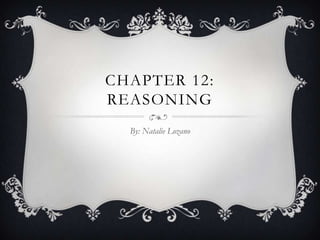
Ch12 reasoning
- 1. CHAPTER 12: REASONING By: Natalie Lozano
- 2. WHAT IS REASONING? Reasoning is the process of creating or generating conclusions from evidence or premises. As humans we want to know what information means and what we can do with it.
- 3. THREE TYPES OF REASONING Inductive Reasoning – how we create generalizations about people, events, and things in our environment. Deductive Reasoning – how we apply those generalizations Fallacies – errors in reasoning
- 4. INDUCTIVE REASONING There are five ways to do this: By example By cause By sign By comparison By authority
- 5. EXAMPLE REASONING Involves using specific instances as a basis for making a valid conclusion. There must be sufficient number of examples to justify the generalized conclusion. The examples must be typical of the whole. Important counterexamples must be accounted for. The examples must be relevant to the time period of your argument. Ex: I have an iPhone, iPod, and a mac and they work well so I would be generalizing all apple products are good.
- 6. CAUSAL REASONING Based on the idea that for every action there is a reaction. The goal is to figure out how or why something happened. The cause must be capable of producing the effects described, and vice versa. Cumulative causal reasoning increases the soundness of the conclusion. Counter causal factors must be accounted for. Ex: A chef at a restaurant is good because they have a Master’s Degree in the culinary field.
- 7. SIGN REASONING Involves inferring a connection between two related things, so that the presence or absence of one indicates the presence or absence of the other. Other substance/attribute relationship must be considered. Cumulative sign reasoning produces a more probable connection. Ex: Football on television is a sign Fall has arrived.
- 8. COMPARISON REASONING Also known as reasoning by analogy involves drawing comparisons between two similar things, what is correct about one is correct about the other. There are two types of comparisons: • Figurative comparison- attempts to link similarities between two cases with different classifications. • Literal comparison- attempts to establish a link between similar classifications. Ex: you can compare a Ford compact to a Toyota compact.
- 9. REASONING FROM AUTHORITY Is used when a person argues that a particular claim is justified because it’s held or advocated by a credible source. It can be used in two ways: first you can ask that an argument be accepted simply because someone you consider an authority advocates it, second you can support the argument with the credibility of another person. Ex: a salesperson trying to sell you something that is good just because a famous person uses it.
- 10. DEDUCTIVE REASONING the process of reasoning from general statements to a certain and logical conclusion related to that conclusion. It has three parts: a major premises, a minor premises, and a conclusion. This is called syllogism. Ex: all telemarketers are obnoxious. Major premise is a general statement. Minor premise specific instance related to the major premise. Conclusion derived from minor premise related to major premise.
- 11. FALLACY An error in reasoning, it differs from factual error, which is simply being wrong about the facts. There are a few that are most commonly used in everyday argumentations. • False dilemma- seeing something as “black and white”. Ex: if you love me you’ll have sex with me. • Appeal of emotion- when someone manipulates peoples emotions to get them to except a claim. • Appeal of ignorance- the argument lacks evidence for evidence to the contrary. Ex: no evidence that God doesn’t exist, therefore, God must exist.